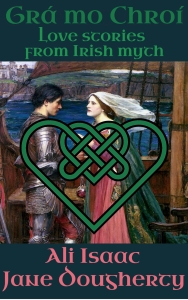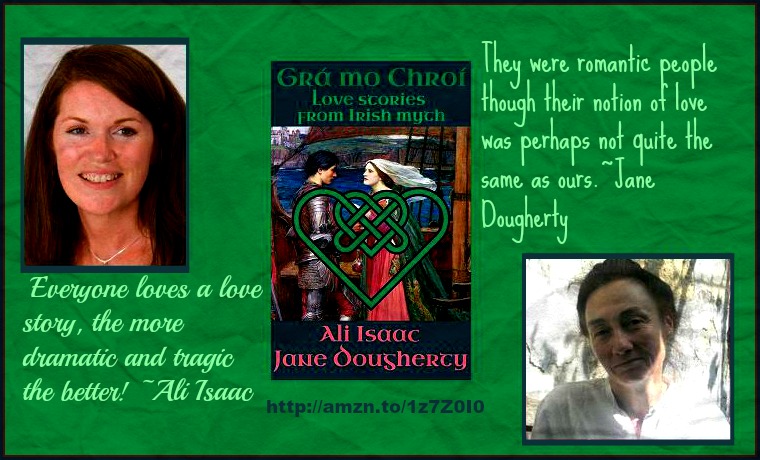Long ago in a green island surrounded by protective mists, a people lived among the relics of a bygone age of which they knew nothing, not being archaeologists, but around whom they created a mythology. They were a volatile people, easily moved to love or war, and motivated by a strict sense of honour. They had women warriors and handsome lovers, wicked queens and cruel kings, precious heroines and flawed heroes. Magic was in the air, beneath the ground, and in the waves of the sea, and hyperbole was the stuff of stories. They were the Irish, and these are a few retellings of some of their beautiful stories.
RW – How did the two of you connect to collaborate on Grá mo Chroí: Love Stories from  Irish Myth?
Irish Myth?
Ali – We had already become friends through our blogs. I had this idea of re-telling stories from Irish mythology kicking around in my head for a long time, in fact, I had been incorporating some of them into my Conor Kelly books. It turned out that Jane, too, had already been re-writing her favorite myths. It just seemed natural that we would join forces and work on a compilation together.
Jane – I started these retellings about a year ago with the story of Deirdre. It was cold, we had had a flurry of snow for about five minutes that had everybody gazing in wonder up at the sky, and the blackbirds were taken by surprise and fussed about in the trees. Something in the combination made me think of Deirdre and her feelings as a young girl kept in seclusion, just waiting to be married to an old king. One story led to another, and when Ali, at the end of last year suggested we have a go at rewriting some of these tragic stories, I knew I could do it. Tragic usually means love stories. Love stories means Valentine’s Day. Our collection had to be ready for February 14th. And it is!
RW – Why a retelling of Irish myth love stories?
 Ali – The first stories we worked on and subsequently revealed to each other just happened to be the most tragic ones, the love stories, perhaps because we connected in some way with the characters and what happened to them. We noticed the theme, and thought it would be fun to launch them for Valentine’s Day. That was in November, so we had to work fast… the Christmas and New Year celebrations held things up, but it’s amazing what you can achieve when you put your mind to it!
Ali – The first stories we worked on and subsequently revealed to each other just happened to be the most tragic ones, the love stories, perhaps because we connected in some way with the characters and what happened to them. We noticed the theme, and thought it would be fun to launch them for Valentine’s Day. That was in November, so we had to work fast… the Christmas and New Year celebrations held things up, but it’s amazing what you can achieve when you put your mind to it!
RW – Why this particular subject for the book? I know there is a bit of an Irish connection.
Ali – Everyone loves a love story, the more dramatic and tragic the better! I am lucky enough to live in Ireland now, and Jane comes of Irish heritage although she lives in France. I never imagined when I came to live here that I would ever fall in love with it so deeply, but I did. I’ve never yet met anyone who has experienced Ireland and didn’t!
RW – How were the stories selected? Was there a unanimous yes to a selection or was it based on what each you wanted to do or was there a hat and slips of paper involved?
Ali – Nope. We just privately wrote the stories which spoke to us and drew us in, and then submitted them for each others perusal. Our writing styles are quite different, but complement each other perfectly. I loved Jane’s versions of the stories, and fortunately, she quite liked mine too!
 Jane – Ali and I have different writing styles, but I think it’s fair to say that both of us have been greatly influenced by the obvious love of nature of the early Celts. Their flattest prose, even their description of combat, is full of poetry. That, for me, is the point of entry into the world of the protagonists of these ancient stories. They looked at a stream, a tree and saw what I see. They listened to the song of the blackbird, the curlew, the cry of the gull, and they heard the same sound. They were romantic people though their notion of love was perhaps not quite the same as ours. That is what I hope we have succeeded in putting across in these retellings.
Jane – Ali and I have different writing styles, but I think it’s fair to say that both of us have been greatly influenced by the obvious love of nature of the early Celts. Their flattest prose, even their description of combat, is full of poetry. That, for me, is the point of entry into the world of the protagonists of these ancient stories. They looked at a stream, a tree and saw what I see. They listened to the song of the blackbird, the curlew, the cry of the gull, and they heard the same sound. They were romantic people though their notion of love was perhaps not quite the same as ours. That is what I hope we have succeeded in putting across in these retellings.
RW – I enjoyed the fact the stories built on each other somewhat. Was that planned or is there a natural vein running through the old Irish stories that lent itself to what you accomplished?
Ali – That seems to happen quite naturally in the mythology, that stories and characters cross-reference each other. But it also helped with the selection, I think. Jane knew that she wanted to write both the Baile and Aillin story, and the Cuchullain and Emer story, which build on each other. Without giving too much away, I was half way through writing my Ciabhan and Cliodhna story, when I realized there was an overlap with the Cuchullain story. Fand’s words of advice to the couple do not appear in the mythology as far as I know, but I thought it would be fun to add them, as the story leant itself so perfectly to that happening.
RW – One character in particular, which I won’t go into detail or give away, I greatly enjoyed reading about in one story and seeing one aspect at one stage of life and then seeing a different stage of life entirely. There is such tragedy at times, is that something common to the Irish love stories or were they the ones you gravitated to for this collaboration?
Ali – Oh yes! The ancient Irish loved a bit of tragedy and sorrow in their stories! And they were masters of it.
RW – Ali, I know you are very involved in another novel series with the Sidhe. Would you explain a bit about who the Sidhe are?
Ali – Originally, the Sidhe were known as the Tuatha de Denann, a race of powerful semi-divine people who arrived in Ireland under very mysterious circumstances around 4000 years ago. They were said to be tall, blonde or red haired with blue or green eyes and fair skin, and were greatly skilled in the battle and magical arts. Eventually though, they were defeated by a race of man called the Milesians. The Denann were forced to retreat to their hollow hills and live forever in that half of Ireland which lies below ground. As time passed, they became known as the Sidhe (Shee), Ireland’s fairy folk, not the type which are tiny and have wings, but as solid and real as you or I, but with strange, unpredictable ways and powers.
RW – I noticed along with the title for each story you give information as to where the story originally came from such as the Ulster Cycle of Irish Mythology and Historical Cycle of Irish Mythology just to name two. What are the differences?
Ali – Basically, there are four main cyles of Irish mythology. They’re just collections of stories really. The first one is the Mythological cycle, and covers the first waves of invasion of Ireland, focusing mainly on the Tuatha de Denann until the Milesians came. The Ulster Cylce tells of Cuchullain and the Red Branch Knights, and Queen Medbh’s Cattle Raid of Cooley. The Fenian Cycle details all the legends attached to hero Fionn mac Cumhall and his warband, the Fianna. The Historical Cycle details all the High Kings of Ireland, and their adventures, but despite its name, cannot be taken as fact.
Jane – There are lots of variations of all the old stories. As they are part of an oral tradition, we know them mainly through the versions noted down by Christian monks. There are regional variations, but also alternative endings, as if someone was trying to change the message, or include a message that wasn’t there before. We can’t know anything for sure, but it rather muddies the waters if we are trying to reach back in time to the emotions of the men and women of pre-Christian Ireland.
RW – Being this is a collection of short stories how was the collaborative process? I imagine it was a little less stressful than say one where you are working on the exact same story such as a full length novel.
Ali – Well for me it was great! Normally, writing a book is such a lonely process, with a lot of responsibility for every aspect of the book falling on your shoulders. This time, there was someone to share it all with, and not only that, someone to bounce ideas off, edit your work, and help with the really hard stuff, like marketing for example.
Jane – Actually, I think without Ali nagging at me to keep popping these stories out, I’d have given up on it. It was Christmas, holidays, flu, sprained back muscle, and if I had been on my own I’d have crawled into a corner and gone into hibernation. Knowing that I’d agreed to go halves in this venture kept me at it. Joking aside, it just wasn’t possible to let Ali down. She’d proposed doing the formatting after all. That was an offer I couldn’t refuse!
RW – Do you have any individual works that people should be on the lookout for in the not too distant future? Or maybe a just released work?
Ali – I have just started writing the third and final book of my Tir na Nog Trilogy, but it always takes me a long time to write a book. I’m aiming for the end of the year for it to be ready for publication. Its working title is Conor Kelly and The Three Waves of Eirean, but  that might change.
that might change.
Jane – My fantasy series has been around since 2014 but I hope to get the rest of my Irish stories ready for publication in the near future.
RW – Who was or is the most influential writer of your writing style? Or what author made you want to be an author?
Ali – It’s impossible to pin influences down to one writer or novel. But in this style, I have two favourites; the late and great Rosemary Sutcliffe, whose novella Tristan and Iseult has stayed with me since I first read it at the age of 9 or 10; and Marion Zimmer Bradley, whose novel The Mists of Avalon is a multi-layered masterpiece.
Jane – I wish I could cite some great writer and claim their influence on my style, but unfortunately I’m not aware of any. Shame. As for the author who decided me to have a go, he is a complete unknown, Dario Nuzzi, the uncle of a great friend of my mother’s. He decided to write after he retired from teaching and just did it. And he got published. If Zio Dario could do it, so could I.
RW – I always like to ask what is an author’s favorite word and why, so I’m asking both of you now to end our time together, what’s your favorite word and why?
Ali – LOL! Not a word really, but I have a strange compulsion to add it to all my emails and blog comments (but not my stories or novels, LOL! See what I mean?). It’s an addiction which, although I hate it, I cannot deny.
(I can attest to this being true. I have more LOL’s in my email since meeting Ali. And as she read this she really did LOL. I can guarantee it.)
Jane – Oriflamme is a favourite of mine. It’s a lovely sounding word, gold and flames, and so evocative of the coloured banners that floated from spears as armies charged into battle. No, I’m not a warmonger, but I love the image.
Too much talent for one man to handle. I asked the questions and got out of the way. I’ve read the book and my review will appear here soon. All I can say about it is, pre-order the book now on Amazon by going to the site and checking it out. And that’s, as I said. all I can say right now. I am looking forward to reading more works from Ireland.
Available
Here are Ali’s various links:
Amazon Author Page You can see all of her books there. Very convenient.
Ali Isaac Storyteller is her website.
And of course follow her on Twitter – @aliisaac_Click this one to follow. There is an underscore at the end of the handle. Thus just click it to make it easier.
Here are Jane’s various links:
Amazon Author Page with more books than you could imagine.
JaneDougherty.WordPress.Com is her website/blog.
@MJDougherty33 is her Twitter handle.
Much Respect and Admiration
© Copyright-All rights reserved by litworldinterviews.wordpress.com 2015




Thank you for putting up with us! It was fun 🙂
LikeLiked by 1 person
Reblogged this on Jane Dougherty Writes and commented:
Second Grá mo Chroí post this morning. Ali Isaac and I talk, as usual. Thank you, Ronovan for listening 🙂
LikeLike
Reblogged this on aliisaacstoryteller and commented:
It’s me and Jane! On Lit World Interviews! Thanks Ronovan!
LikeLike
Preordered! And you are right; Ali’s probably the only one who LOLs about as much as I do… 😀
LikeLiked by 2 people
Brilliant interview Ronovan, Jane and Ali 🙂
LikeLiked by 1 person
I saw Ali’s post about her collaboration with Jane and it sounds great. I love old stories and retellings so I’m putting it on my list. Great double interview!
LikeLike
Reblogged this on Chris The Story Reading Ape's Blog….. An Author Promotions Enterprise! and commented:
Did you hear the one about the two authors and the interviewer? 😀
LikeLike
Reblogged this on sherriemiranda1 and commented:
Sounds really interesting!
LikeLike
Reblogged this on Authors to Watch and commented:
I hope you enjoy this excellent interview. Jane Dougherty and Ali Isaac talk about their latest collaboration.
LikeLike
Great interview. I especially enjoyed reading about their blogging relationship developed into this collaboration.
LikeLiked by 1 person
Thanks, Ronovan, Ali, and Jane for the great interview/review.
LikeLike
Reblogged this on theowlladyblog.
LikeLike